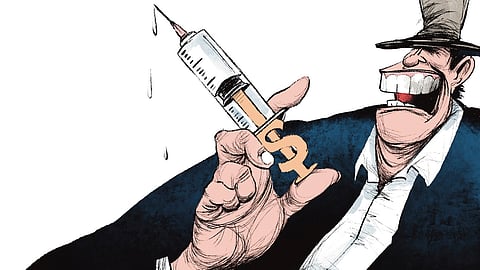

Just over four years ago, a novel virus emerged to trigger the Covid-19 pandemic. As it rampaged across the world, spawning an unprecedented terror of death and spinning national economies into unanticipated turbulence, the pandemic demanded a coordinated global response. A rallying cry for global solidarity rang loud—“No country is safe till every country is safe!” Not only did the virus spread fast, the variants that emerged from different parts of the world exhibited greater infectivity and competed for global conquest. Global cooperation became critical for the survival of humanity. However, this realisation did not readily translate into reality when it came to sharing data, resources and technologies.
Recognising the failures that hindered a unified global thrust against a global threat, the world is now negotiating a Pandemic Treaty for prevention, preparation and response (PPR). This effort, under the auspices of the World Health Organization, is expected to emerge in May 2024. Simultaneously, a revision of the International Health Regulations is also under negotiation. It is intended to improve global surveillance, notification, containment and data sharing arrangements that all countries must subscribe and adhere to.
While the WHO has been designated as the world’s premier public health agency, its ability to ‘govern’ or even steer global health policies is greatly limited by two major constraints. The first is a low level of committed financing from member countries, making it dependent on a few high-income countries (HICs) and private foundations. The second is the emergence of other influential actors in global health, such as multilateral development banks (MDBs), other multilateral UN organisations and large private foundations. Each of these actors is influenced by the priorities of HICs, making global health policy development a skewed process.
The dominance of HICs in shaping health policies and programmes has long been a historical feature as ‘global health’ evolved through several stages in the 19th and 20th centuries. In the era of European colonisation of Asia, Africa and South America, there was concern over infectious diseases that occurred in the ‘natives’. The colonisers were afraid their soldiers, traders and administrators, who collectively represented colonial power and enabled capture, would contract deadly or disfiguring diseases like malaria, smallpox or leprosy. So ‘tropical medicine’ emerged as a priority. While sections of the local populations benefited from these efforts, the principal aim was to protect the colonisers and also labouring natives who created wealth for the colonial power. Research into tropical diseases was encouraged to protect the economic and military interests of the colonial powers.
In the post-colonial era, tropical medicine was transformed into ‘international health’. HICs still engaged with the newly independent countries, but through ‘development aid’ and ‘technical assistance’. European countries were joined by other HICs like the US, Japan, Canada, Australia and New Zealand. The former Soviet Union too provided some support, but the arena of international health was dominated by the western alliance. Aid for health was an instrument of trade policy, to create markets for vaccines, antibiotics and other antimicrobial drugs. Infectious diseases remained priority, though maternal and child health also acquired prominence over time. Population control too became a priority as expanding populations in low- and middle-income countries were viewed as detrimental to economic development and a possible threat to western hegemony.
With the emergence of HIV-AIDS as a major threat in the later decades of the 20th century international health hit the panic button and transformed itself into ‘global health’. New multilateral agencies were created, like UNAIDS. George W Bush launched the President’s Emergency Plan For AIDS Relief (PEPFAR), which provided support to HIV-affected countries, especially in Africa. The Global Fund for AIDS, Tuberculosis and Malaria came into being in 2002 as an initiative of the G8 countries.
The World Bank became increasingly influential in health, setting terms for providing financial assistance to LMICs in the form of soft loans. ‘Health sector reforms’ and ‘restructuring’ became prescriptions to LMICs, as neo-liberal economic policies began to hold sway in HICs who play a major role in determining the priorities of the World Bank and other MDBs. In recent years, these banks have recognised the damage done to the health sector in LMICs through such prescriptions and are becoming more responsive to country priorities.
Non-communicable diseases (NCDs) were excluded from the aid ambit, despite evidence of their high and rising burdens in LMICs. It was only when large ‘emerging economies’ among LMICs started including NCDs among their government-funded health programmes and as a component of universal coverage that manufacturers of NCD-related drugs and devices in HICs recognised a huge opportunity. Accordingly, governments of HICs and MDBs too belatedly acknowledged NCDs as a ‘new’ global health priority.
It was expected that the Covid experience would change the situation of power asymmetry in global health. Inter-dependence was clearly recognised as a feature of the interconnected world, with consensus building in global health policymaking processes and collaborative design of health programmes seen as inescapable requirements. However, HICs continue to pursue trade interests at the cost of health equity, undermining efficiency and oblivious to empathy. Despite bitter lessons of vaccine equity during the active phase of the pandemic, HICs opposed the India-South Africa initiative for patent waivers on vaccines, drugs and diagnostics (at the WTO). Even during the ongoing negotiations on the pandemic treaty, ‘intellectual property’ is being fiercely defended. Their defence of proprietary science is sacrificing public good while shielding private profit.
A new global order is needed, where collective welfare must guide global economic, social and environmental policies. While the WHO must remain a key coordinating agency, all actors engaged in public health must commit to global health equity in word and deed. The Covid pandemic as well as accelerating climate change provided us this strong message. Global health must reinvent itself as a common global good. LMICs must assertively play a strong role in determining the future form, function and governance of global health.
(Views are personal)
(ksrinath.reddy@phfi.org)
K Srinath Reddy |Distinguished Professor of Public Health, PHFI